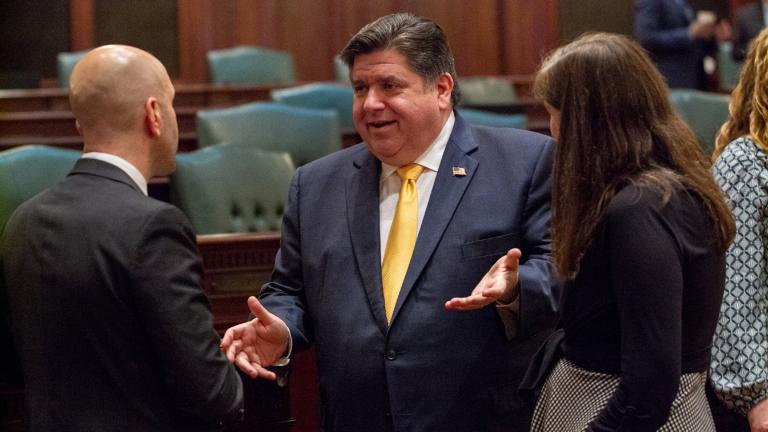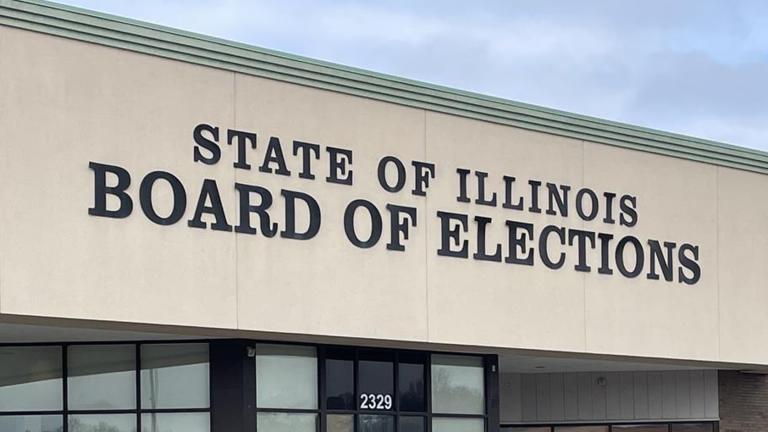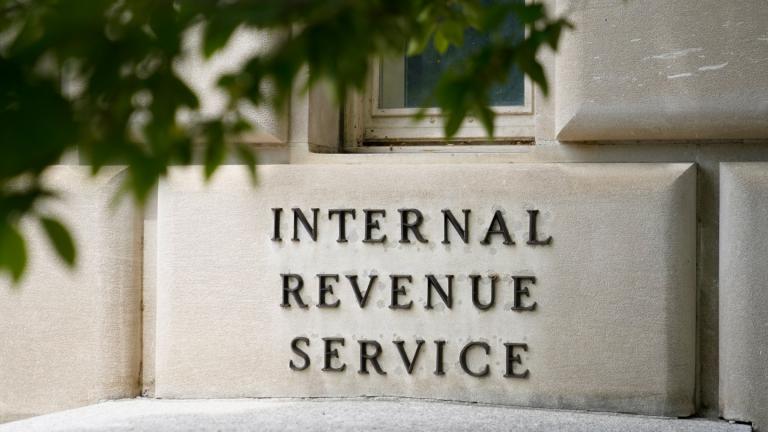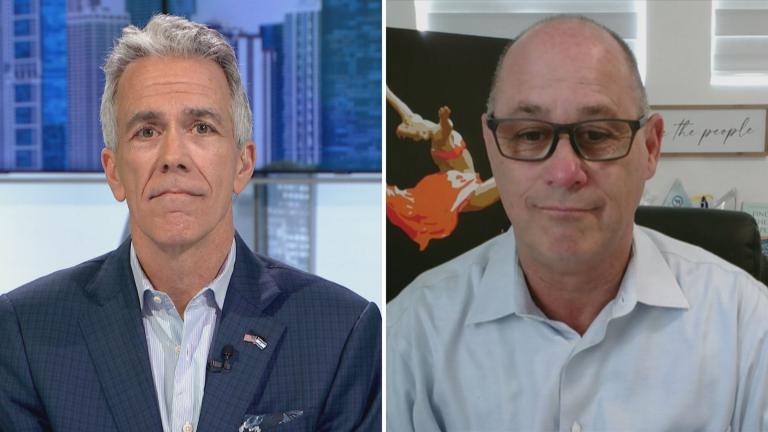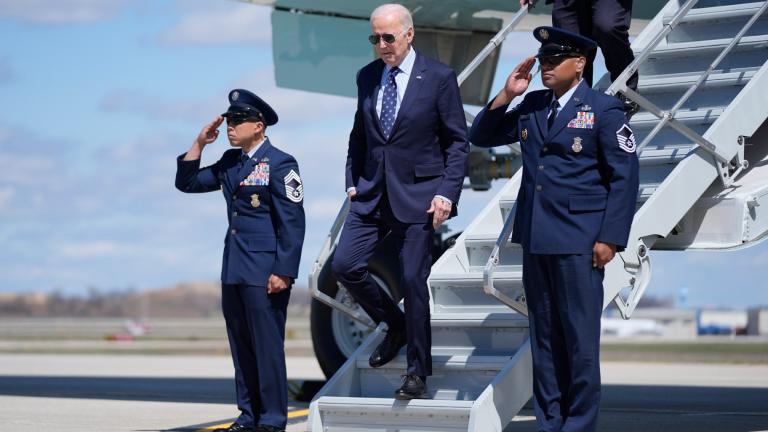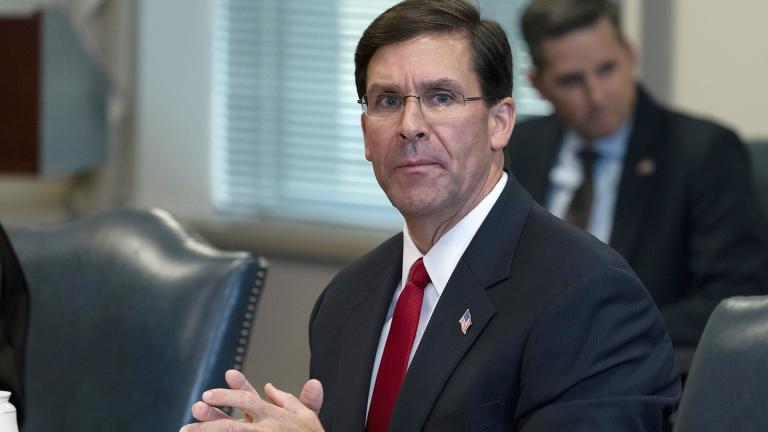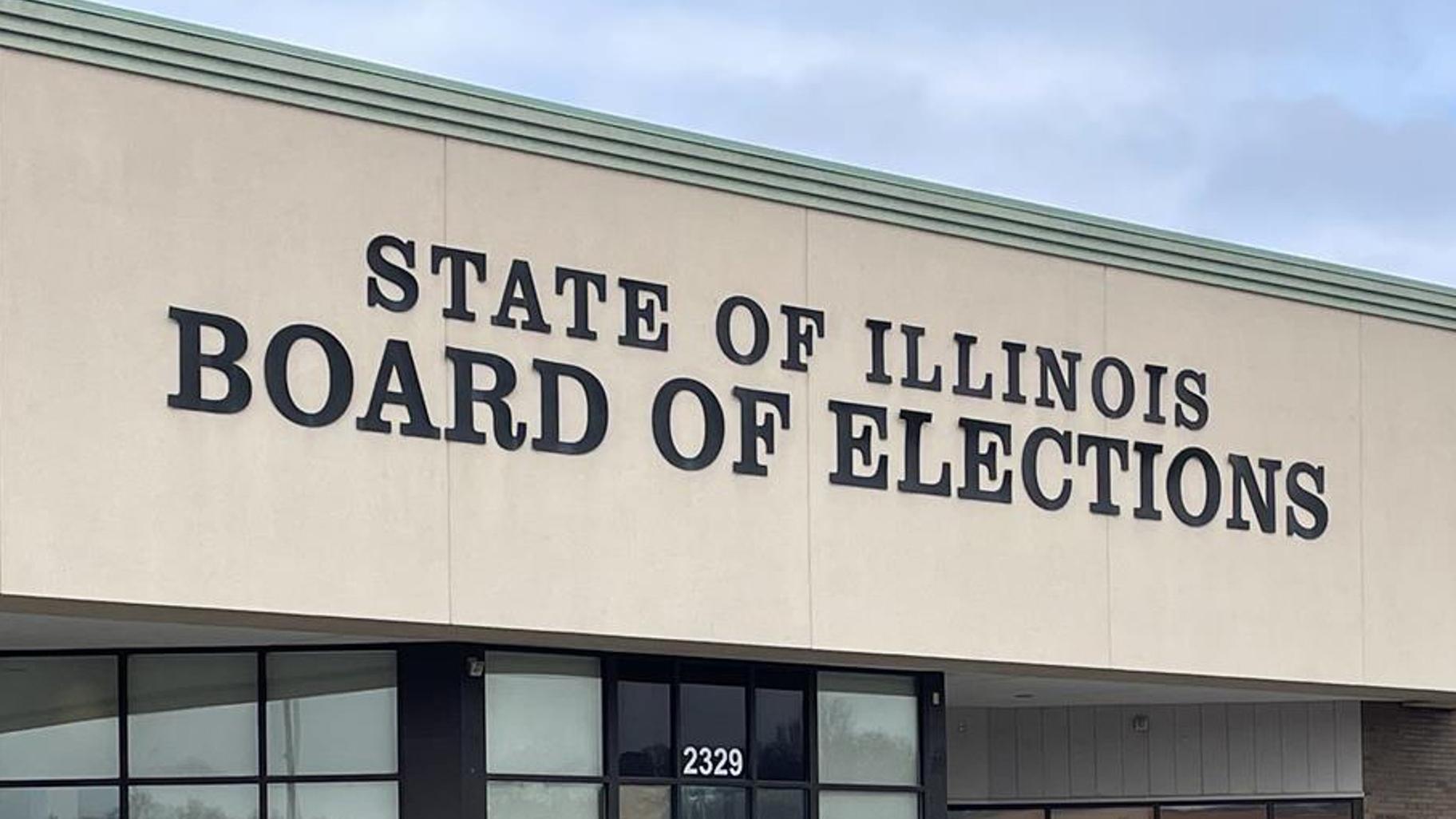 The Illinois State Board of Elections building is pictured in Springfield. (Peter Hancock / Capitol News Illinois)
The Illinois State Board of Elections building is pictured in Springfield. (Peter Hancock / Capitol News Illinois)
State election officials are set to decide on Tuesday whether President Joe Biden and former President Donald Trump will be on Illinois’ presidential primary ballot, following Friday hearings at which objectors to both men allege they don’t qualify because of the 14th Amendment.
In Trump’s case, objectors argue the former president’s role in the Jan. 6, 2021, attacks on the U.S. Capitol was a breach of the constitution’s clause banning those who “engaged in insurrection or rebellion” to hold federal elected office.
In Biden’s case, objectors argue the current president’s policies on immigration make him ineligible because of the 14th Amendment’s clause banning those who provide “aid or comfort to the enemies” of the United States from holding federal office.
THE TRUMP QUESTION
The case against Trump mirrors the argument that led Colorado to knock the former president from its ballot.
Whether that will hold is to be determined Feb. 8 by the U.S. Supreme Court. Should justices toss Colorado’s decision, it would likely void attempts to ban Trump from the ballot in other states.
But state elections officials are scheduled to make their judgment before then.
The Trump objectors’ attorney, Matthew Piers, said the Jan. 6 riots were “the first time in nation’s history the peaceful transfer of power was interrupted,” and that Trump played a direct role, providing “material assistance” and encouragement.
“(Trump) incited the crowd into a frenzy against the vice president of the United States, members of Congress, and in support of Mr. Trump’s own stated goal — stopping the process of counting the electoral votes,” Piers argued before Clark Erickson, a retired longtime judge from Kankakee County serving as a hearing officer for the Illinois State Board of Elections.
Piers said it was an insurrection and a “stain on the history of our nation” that “must be rejected in the strongest possible way.”
As evidence, he played a portion of a video from the U.S. House committee that investigated the Jan. 6 attack, showing Trump talking to a crowd before a mob stormed the Capitol.
A lawyer for Trump, former Colorado Secretary of State Scott Gessler, said the video was inappropriate to rely on because it was “highly curated” and edited to “raise our emotions.”
Gessler said that what happened that day in early 2021 was not an insurrection because there was no evidence anyone was armed, that the mob was unified or that anyone was serious about harming then Vice President Mike Pence.
Gessler said Trump’s speech leading up to the events of Jan. 6 encouraged protestors to make their stance known “peacefully and patriotically,” and that when Trump told supporters to “fight like hell” it wasn’t incendiary speech tantamount to inciting an insurrection.
Rather, Gessler said, that type of combative language is common in politics.
Gessler played Erickson his own video, showing prominent Democrats including Vice President Kamala Harris giving passionate speeches using the word “fight.”
Further, Gessler argued, inciting an insurrection is not the same as engaging in one, and it’s only the latter that’s part of the constitution.
Trump’s legal team also argued that Illinois’ election board is not authorized to “delve into the federal constitutional qualifications of presidential candidates,” and that as a state body it should limit its ballot qualification decisions to matters like whether nominating petitions are filed on time.
Piers pushed back against the claims that the state board lacks authority and that the case is too complex for the board to take on.
“Not only does the board have full authority” and the ability to take on objects’ complaints, he said, the board has a “statutory mandate” to do so.
THE BIDEN QUESTION
Two sets of objectors filed cases seeking to remove Biden from Illinois’ primary ballot, both of which were heard by Springfield elections attorney David Herman.
In both cases, Herman went out of his way to keep things civil, reminding both sides that there wouldn’t be a proper transcript of the proceedings if people talked over one another.
“I’m not trying to be oppressive,” he said at one point. At another: “Rules are rules, and I’m not trying to be a jerk about it.”
One case was brought by a group including Art Jones, a frequent candidate who in 2018 was denounced by the Republican Party as a neo-Nazi.
Jones was the sole objector from his group to appear at Friday’s hearing. He gave animated testimony alleging Biden’s “open border immigration policy has been a disaster” that’s led to “sickness spreading” including potentially the Ebola virus — allegations to which Biden’s attorney Kevin Morphew repeatedly objected, to the agitation of Jones.
“I don’t even know why you’re allowing him to proceed,” Morphew said of Jones, noting that the objectors offered no exhibits or witness lists, instead relying only on what Morphew called “hearsay.”
Morphew also argued that the other attempt to deem Biden ineligible relied on politics and policies, not a credible challenge.
The objectors — Shane Bouvet, Timothy Conrad, Terry Newsome and Peggy Hubbard — argued that Biden’s immigration policy was akin to aiding national enemies.
Hubbard said Biden shouldn’t be on the ballot because he’s “totally unfit to be elected as commander in chief,” while Newsome said “this is unprecedented where you have millions of illegal aliens, terrorists, drug cartels, Chinese flooding our borders. And it’s not for the purpose of the United States of America; it’s aid and comfort being given to these other individuals that is not a benefit to the United States of America.”
Morphew again argued the claims were “politically charged,” inadmissible hearsay and lacked evidence.
“This is merely taking policy disagreements, bringing them before the board of elections and saying, ‘Don’t put this person on the ballot. I don’t like the way they govern.’ The way that we do that in America is we vote for the other person. We don’t knock them off the ballot,” Morphew said.
He said it sets a bad precedent for the state elections authorities to hold a hearing on objections that “use political propaganda” from the opposing party as basis for a qualifications challenge.
“It’s very, very troubling that the board entertains and allows arguments on these cases,” Morphew said.
Conrad had separately objected to Biden’s petitions to run in Illinois because he said Biden’s statement of candidacy was notarized by someone commissioned in Washington, D.C., rather than Illinois.
WHAT’S NEXT
It will be a busy weekend for the hearing officers, as well as for the Illinois State Board of Elections’ general counsel.
“This is kind of crunch time,” said ISBE spokesman Matt Dietrich.
Dietrich said Erickson and Herman will each write a report on Friday’s evidentiary hearing and give a recommendation on whether the objections should be sustained or overruled.
The election board’s attorney uses those reports to make a recommendation of her own.
All of the findings are to be formally presented to the bipartisan board of elections at its hearing on Tuesday morning.
Follow Amanda Vinicky on Twitter: @AmandaVinicky

